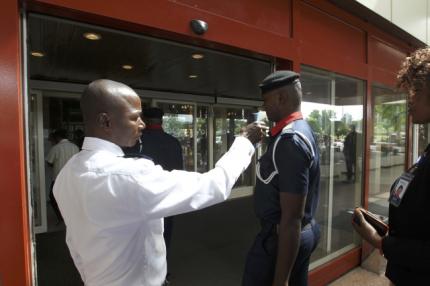Vietnamese health authorities on Wednesday released a Nigerian man from a hospital where he had been isolated, after he recovered from a fever and developed no signs of the Ebola virus.
Nweka Fortune Chukwuyem, 36, of Nigerian nationality, was discharged from the Ba Ria Hospital in the southern province of Ba Ria-Vung Tau yesterday evening, with the approval of the Health Ministry and the provincial Department of Health, said Nguyen Van Thai, deputy director of the provincial health department. However, Chukwuyem has been given instructions on how to self-monitor his health until the 21st day after his departure from Nigeria.
The 21-day health monitoring period for signs of Ebola infection is necessary, as this is the maximum incubation period for EVD, the doctor explained.
Chukwuyem is a contractor working with a Vietnamese company in the coastal city of Vung Tau.
He arrived in Vietnam at Tan Son Nhat International Airport on September 14 and went through health quarantine procedures without any symptoms of EVD found. However, he developed a high fever two days later while staying at a hotel in Vung Tau. He was hospitalized on Tuesday and was isolated for treatment in accordance with relevant health ministry regulations. After his hospitalization, health workers from the provincial Preventive Health Center disinfected his office and his hotel room.
The Ho Chi Minh City Pasteur Institute sent specialists to the hospital to take blood samples from the patient for testing. The ongoing Ebola outbreak has infected 5,000 people in West Africa, more than 2,500 of whom have died, the World Health Organization said on Tuesday. The countries so far affected by the deadly virus are Liberia, Guinea, Sierra Leone, Nigeria, Congo, and Senegal. Most of the deaths have occurred in Liberia. As a severe acute viral illness, Ebola virus disease, or EVD, which broke out in December 2013 in Guinea, is often characterized by the sudden onset of fever, intense weakness, muscle pain, headache and sore throat, according to the WHO. EVD is a severe, often fatal illness, with a fatality rate of up to 90%, the WHO warned.
The viral infection is transmitted by direct contact with the blood, body fluids or tissues of infected animals or people. Vietnam has yet to detect anyone infected with the fatal virus, but the Ministry of Public Security has issued an action plan to prevent possible penetration by travelers from Ebola-hit countries. The ministry has recently issued a new rule requiring all visitors arriving in Vietnam from the impacted areas to fill out health declaration forms as a measure to prevent the spread of the deadly virus.






















































